- Home
- Joe R. Lansdale
All the Earth, Thrown to the Sky Page 7
All the Earth, Thrown to the Sky Read online
Page 7
I crawled in and Jane and Tony crawled after me. We kept crawling toward what little light we could see on the other side. Behind us the dark shadow of the grasshoppers covered the ground.
We crawled for a long ways, and it was tight in there. I feared for a moment I was going to get stuck. But I made it. A water snake was swimming briskly in front of me, heading for the light. It wasn’t a poisonous snake, but it gave me the willies nonetheless.
I dug in with my elbows and kept my head down and kept going. The light was getting brighter. It was tight now on the sides and at the top. I couldn’t turn my head anymore and look back. The roots were starting to catch in my hair, but I kept moving. My hair got snapped out of my head by the roots as I crawled.
Finally I came to where the light was, and the hole was very small there. I laid with my face turned to keep my nose out of the little bit of water and pushed on through, breaking some of the ground apart as I did. I came out on the other side and rolled down a sandy hill and into a wind-made ditch.
I crawled up the side of the hill and took a look. I could see the Ford. It was covered in grasshoppers.
It was like where we were was the line. Everything on the other side of the ditch was grasshoppers. On this side was just us.
“Now’s our chance,” I said.
Ducking low, we ran away from the ditch, away from the Ford and all the grasshoppers, away from Timmy and Bad Tiger.
We went swiftly across a large field. Then we came to the main road and crossed over that, went down a small ridge of dirt, then moved toward a cluster of trees that had long ago been hit by sand and grasshoppers. There was nothing for the grasshoppers to like anymore. They had left nothing. Like so many trees around here, they was just big dry sticks.
The tree trunks were pretty big, though, so we got behind those for a second, dropping down on our knees and looking back across the way as we got our breath.
The grasshoppers had turned slightly and were moving across the sky like a giant wiggling snake, and now there were more than before, and everything was dark and thick with them. I figured pretty soon they would be smashing into the trees where we were, into us.
It was then that Jane said, “Jack. They’ve eaten off the back of your shirt.”
I took off my shirt and just had on my dirty undershirt. The back of my shirt was split open in a jagged way. The grasshoppers had eaten a large stretch of cotton out of it.
Jane laughed. She held up her hand. She was still clutching the toilet paper. It was dirty and wet, but she still had it.
I said, “Turn around.”
She did. The back of her pants had been bitten out by the bugs and I could see her underthings. I told her.
“Oh no. Give me your shirt.”
I gave it to her, and she tied it around her waist so what was left of my shirt covered her rear end.
We turned Tony around and gave him a look. They hadn’t hit him at all.
“How about that,” I said. “Our moment came.”
“Well, it’s only a moment,” Jane said. “So we got to hustle away from here, and fast.”
20
Walking along through what had once been farmland but was now nothing but sand, we came to an old barn that was mostly fallen down. The sky was clear, and night was setting in, and the stars were bright. We didn’t know if Bad Tiger and Timmy were still looking for us, but we stayed away from the road.
Earlier, we thought we heard the Ford’s big engine whining along up over the rise, on the main road. Going first one way, then the other. We heard a door slam, and I thought I could hear men talking. I didn’t know for sure that it was Bad Tiger and Timmy, but I wasn’t interested enough to go up there and find out.
The barn was way off from the road, and it had three good sides and most of a roof. We went inside. There was an old sand-covered tarp in there, and we scraped the sand off with our feet, which took some time; then we took the tarp out into the open air and shook it and snapped the dust off of it.
Carrying the tarp back inside, we laid it out on the sand and pushed it down with our hands and knees and found us a place to lie down. It was the best bed I had been on in a while.
As we lay there, I told them about Strangler Nugowski. I told them what he had done and that he was probably in Tyler, Texas, and Bad Tiger and Timmy were going after him.
“Why didn’t you tell us before?” asked Jane.
“When? During the grasshopper storm, or while we was sleeping last night?” I said. “I ain’t exactly had the time for an in-depth conversation.”
“All right,” Jane said, “you can slide by on that one.
“Strangler?” Jane said. “Really? Is that what his mother named him? ‘Come on in to supper, Strangler. Come on in and wash your hands and I’ll let you strangle one of the chickens for us to eat. Course, you have to wash your hands again.’ ”
“I kind of doubt his given name is Strangler,” I said.
“I’d like to see his birth certificate,” Jane said. “I think it would be funny if his mama named him Strangler and it says so right there on the paper.”
I laughed that time. It wasn’t that funny, but I was tired and everything seemed kind of amusing right then.
“I don’t know,” Tony said. “I wish my name was something like that. I wouldn’t mind being called Crusher.”
“Go on to sleep, Crusher,” I said.
“That poor man,” Jane said. “Them going after him and all.”
“He stole money too,” I said. “And he might have shot someone. He might have shot Buddy.”
“But him taking the money to fix his daughter’s foot,” she said. “That’s sweet.”
“I suppose,” I said.
“Maybe y’all could call me Crusher from now on,” Tony said.
“No,” me and Jane said together.
“We are not going to call you Crusher,” Jane said. “Tony is a perfectly good name.”
“It sounds sissy to me,” Tony said.
“It’s fine,” Jane said. “Tell him, Jack.”
“It’s fine,” I said.
“You say that ’cause you’re sweet on her,” Tony said.
“I am not,” I said.
“Oh, come on,” Jane said. “You are too.”
“I’m not.”
“Yes you are. You let me put my head on your shoulder all night.”
“I was just being nice,” I said.
“Sure you were,” Jane said.
“Well, you’re the one put your head on my shoulder,” I said.
“It was better than the hard ground or that tree trunk,” she said.
I didn’t have anything to say to that. I was still trying to think of a snappy comeback when Jane said, “I still got the toilet paper anyone needs it. It’s mostly dry, and you can peel off a couple layers you need to go.”
Neither Tony or me answered. I could hear Tony already breathing evenly in deep sleep.
Jane said softly, “We still live.”
Next thing I knew, it was morning.
21
In the morning we brushed ourselves off as best we could and walked up to the road and looked around carefully. We didn’t see Bad Tiger, Timmy, or the Ford.
I couldn’t imagine them hanging around. They didn’t want us so bad they’d chance being found by the law, or so I thought. Still, we stayed cautious.
We posted a lookout at the edge of the road behind a tree, and the idea was to switch from time to time, until we saw a car or truck coming that we thought might give us a ride.
I hadn’t been on duty more than a few minutes, when I looked up the road and saw a truck with panel boards on the back moving toward us.
I whistled up Jane and Tony. They came running. I went to the side of the road and put a thumb out. Jane and Tony were soon standing beside me, doing the same.
The truck stopped. It was a man who might have been younger than he looked, ’cause his teeth were missing and his clothes were worn and h
e hadn’t shaved in a few days, and his skin had burned the color of dried blood.
He stuck his head out the window, said, “You’re going my way, you can ride. But there’s hogs in the back. The girl can sit up here if she likes.”
“I like,” Jane said, then went around in front of the truck and got in on the passenger’s side.
Me and Tony went around back and climbed over the boards and eased ourselves inside the truck bed with a half dozen small black and white hogs and a piglet. There was hog mess on the floor and it stunk.
We clung to the wood slats and the man drove us out of there. It was better when we got to moving, because the wind blew some of the stink away, and it felt good because it was starting to turn off hot.
I could see through the back window that Jane was chatting the driver up, maybe telling him how we were a talented bunch of singers on our way to make our fortune with our family in East Texas. Or maybe it was some other lie. Anyway, she was talking a lot, and he was nodding and grinning.
We rode into a little town where everything seemed to be either gray or orange. Once, the buildings had been brightly painted, but the sandstorms had sanded them down and made them bleaker. The orange was the color that was left after all the paint had been worked over by sand. Before the sand, it could have been red or yellow.
We were let off in front of the general store. We had lost our bags of goods, but Jane still had the money she had saved stuffed in her pocket, and I still had my pocketknife, so we weren’t without something.
In the store we looked around for a box of crackers and had the counterman cut us off a chunk of rat cheese and some bologna and we bought some bread by the slice. We got a half dozen Coca-Colas and a few penny candies.
The counterman wrapped up the bread and meat and cheese in separate pieces of wax paper, and then he wrapped it all up in brown paper. Jane paid for it. He put it all in a grocery bag, except the Coca-Colas, and he put those in a double bag so where they were damp from the cooler they wouldn’t wet through the sack.
A nice-looking woman standing behind us in line, said, “What have you children been doing? You smell like hogs.”
“We’re pretty near out of money,” Jane said. “In fact, what we just spent is about it. Those two got that stench from cleaning out a man’s hogpens with shovels. I did the wash for him too. He paid us mostly in food and a night’s sleep, but a bath is something we haven’t had. And truthfully, if anyone ever needed it, it’s those two.”
“You don’t even have a shirt?” the woman said to me.
“I started not to let him in the store dressed like that,” said the counterman, “wearing that dirty undershirt, but I figured it wasn’t by choice.”
“No, it wasn’t,” Jane said. “We been hitchhiking for a week on account of our parents just dropped us off on the side of the road. Us and our old yellow dog. They told us we was going to stop and pick flowers, ’cause our grandparents were buried up this way. But that was a lie. They drove off and left us when we was out picking.”
“I ain’t seen a flower around here in a month of Sundays,” the counterman said. “The storms have knocked them all down.”
“There were just three or four, actually,” Jane said. “You don’t expect your folks to do a thing like that. Lie to you about your grandparents’ graves, and there being flowers, and then them just driving off and leaving us. It wasn’t something we expected.”
“What happened to the dog?” the lady asked.
“Hit by a truck,” Jane said. “Happened pretty quick. Merciful, really, otherwise he would have starved to death, and we might even have had to eat him. Our parents never named him for just that reason. They said you shouldn’t name something you might have to eat. They used to joke that they wasn’t sure they was going to name us.”
“That’s awful,” said the lady.
“Isn’t it?” Jane said.
“Beside the road?” the woman said. “Well, my goodness. And your dog run over too.”
“It was pretty sad,” Jane said, “but I’ve tried to keep us together and not let these two get in any trouble. We had to rent Jack here out to a man we come across, for … well, who knows what.”
“You poor child,” the woman said, and put her hand on my head. She pulled it back pretty quick, though. My hair was full of grasshopper guts, grit, and pig stink.
“You rented your brother out?” the counterman said. “You rented him?”
“Hunger is not a great bearer of judgment,” Jane said.
“That sounds like a cock-and-bull story to me,” said the counterman.
“Oh, don’t say that,” said the lady. “You kids come with me. I’ll see you get a real meal. We’ll put those things of yours in the icebox. You can get a bath, and tomorrow I’ll talk to my church friends, and maybe we can find you a home. We’ve done a lot for orphans.”
“Thank you,” said Jane. “It’s good to know that Christian charity still exists in this world. I, for one, had come to doubt it.”
The woman said, “Come on,” and started leading us out the door.
I hadn’t taken a step, though, when the counterman reached across the counter and got me by the elbow.
“Hey, now. Mrs. Carson is a good widow lady. Don’t you kids go and take advantage of her.”
I looked up and saw Jane and Tony and the lady were near the door.
“We’ve had a hard time of it,” I said.
“I don’t believe a word of it,” he said.
“You think that’s something,” I said, “you ought to hear the truth.”
I pulled loose of him and followed them outside.
22
It was night and it was cool, and me and Jane were sitting in Mrs. Carson’s porch swing. Tony was inside at the table eating a large piece of chocolate cake. His third.
I could turn in the swing and look through the window and see him in there. Mrs. Carson was fussing over him, pouring him up a glass of milk. When she finished doing that, she sat down to talk to him. She really had taken a shine to Tony.
We were all clean, having bathed and washed our hair. We had been given clothes that Mrs. Carson had gotten from some of her church friends. Now me and Jane had cups of hot cocoa and were sitting in the swing, moving it slightly with our feet.
It felt good to be clean, but it didn’t feel good to have hoodwinked that poor lady.
“Mrs. Carson must be rich,” Jane said.
“You really had to say I was hired out like that?”
“It just come to me.”
“The man in the store didn’t believe a word of it. And you had to add in a dog?”
“It wasn’t as crazy as what really happened. Picked up by gangsters, saw a man shot, and then we snuck off in a grasshopper storm.”
“You forgot stealing a car from a dead man,” I said. “And leaving your father under his tractor and a pile of sand.”
“Me and him never did get along.”
“That’s still not a good reason to leave him under a tractor,” I said.
“It is sad,” she said, “but I didn’t have a family like yours. They loved you.”
“Daddy could have loved me better,” I said. “He hung himself and left me to fend for things.”
“Yeah, that wasn’t good.”
“But I’ll tell you, Jane. I think about them at least once every hour of every day.”
“I know you mean that symbolically,” she said, “because you don’t have a watch.”
I grinned at her. Sometimes with Jane, it was all you could do.
“Well, I think about them a lot. And it is every day. At first, I kept thinking about Daddy hanging and Mama dead in her bed. But now I don’t think about that so much. I think about the good times, and there was plenty. If Mama hadn’t got sick, everything would have been okay.”
“If there hadn’t been sandstorms, she wouldn’t have been sick,” Jane said. “There hadn’t been a dust bowl and grasshoppers and the like, we’d all be fi
ne. Well, almost. Like I said, I was planning on leaving from the time I knew there was a way out. I was going to go just as soon as I could. Pa going down under that tractor was just the straw that broke the camel’s back. I wanted to be anywhere but where we was.”
“If Mama and Daddy had been all right,” I said, “I could have stayed.”
“Yeah, well,” Jane said. “Everyone’s not made the same.”
She turned and looked back through the window behind the swing. “Tony looks happy,” she said.
“Yeah,” I said.
“I was wondering if he should stay.”
“I take it we aren’t?” I said.
“Of course not. Mrs. Carson gets to thinking about that story, and that store man tells her he doesn’t believe it, and we have to back it up somehow, we’re cooked. But Tony, I think he could stay and they wouldn’t care about the lie.”
“He won’t stay,” I said. “He’ll go with you.”
“Maybe.”
“Where exactly are we going, anyway?” I said.
“I figured that was clear,” she said.
“Not to me.”
“We can’t let Strangler get killed on account of he stole money to help his kid.”
“We can’t?”
“We shouldn’t. Strangler being a father like that, he’s more than mine was. Pa wouldn’t have done nothing to make things bad for us, but if I needed an operation for something, I’d have had to cut on myself with a butter knife and patch it all up with flour paste and a roll of electrician’s tape. He’d have called it God’s will, me coming down with some problem or the other.”
“It’s really none of our business,” I said. “Strangler has to tote his own water.”

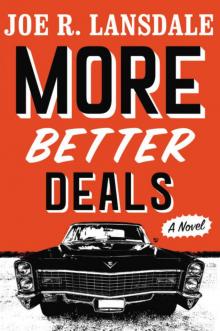 More Better Deals
More Better Deals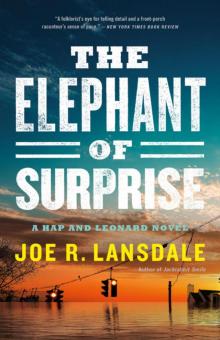 The Elephant of Surprise
The Elephant of Surprise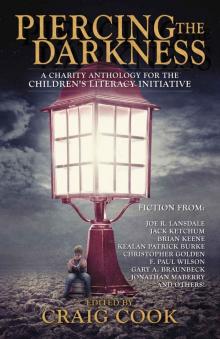 Piercing the Darkness: A Charity Horror Anthology for the Children's Literacy Initiative
Piercing the Darkness: A Charity Horror Anthology for the Children's Literacy Initiative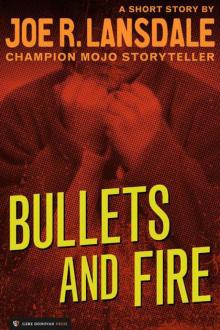 Bullets and Fire
Bullets and Fire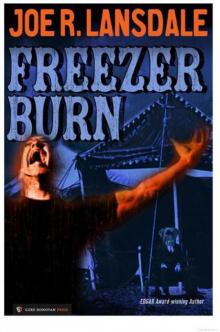 Freezer Burn
Freezer Burn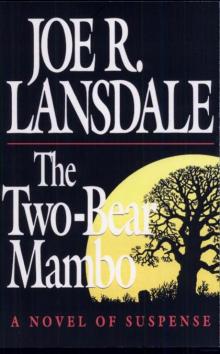 The Two-Bear Mambo
The Two-Bear Mambo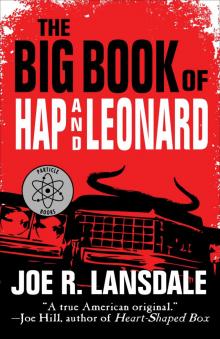 The Big Book of Hap and Leonard
The Big Book of Hap and Leonard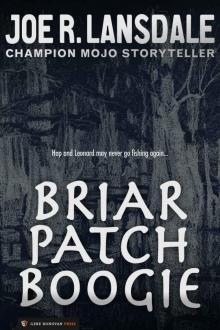 Briar Patch Boogie: A Hap and Leonard Novelette
Briar Patch Boogie: A Hap and Leonard Novelette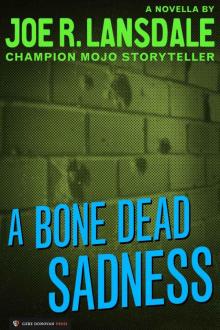 A Bone Dead Sadness
A Bone Dead Sadness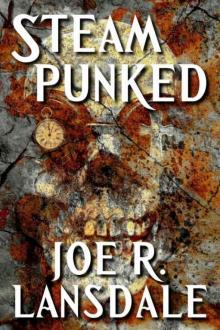 Steampunked
Steampunked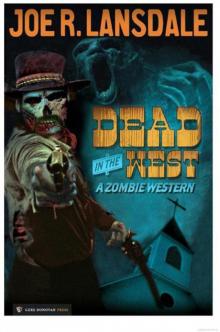 Dead in the West
Dead in the West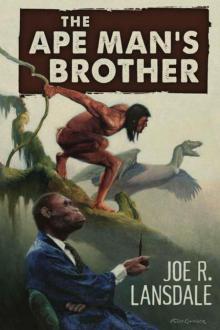 The Ape Man's Brother
The Ape Man's Brother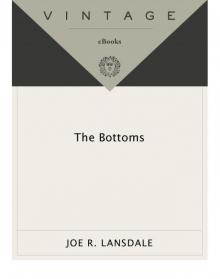 The Bottoms
The Bottoms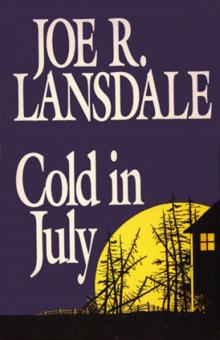 Cold in July
Cold in July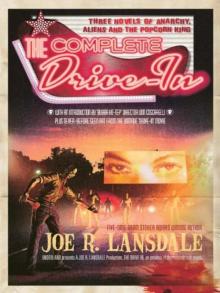 The Complete Drive-In
The Complete Drive-In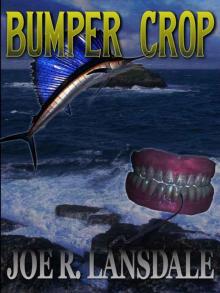 Bumper Crop
Bumper Crop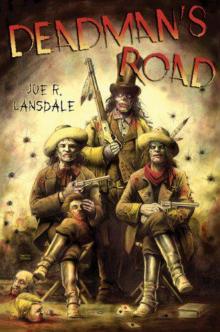 Deadman's Road
Deadman's Road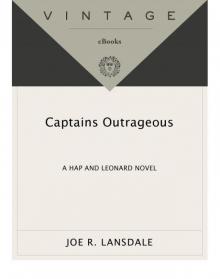 Captains Outrageous
Captains Outrageous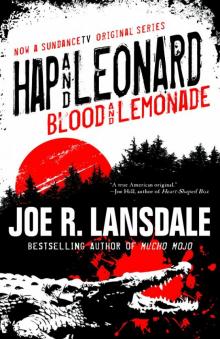 Hap and Leonard: Blood and Lemonade
Hap and Leonard: Blood and Lemonade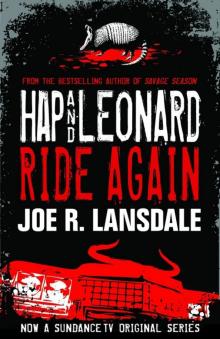 Hap and Leonard Ride Again
Hap and Leonard Ride Again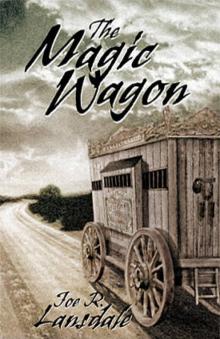 Magic Wagon
Magic Wagon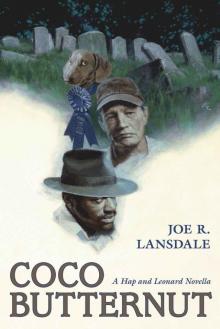 Coco Butternut
Coco Butternut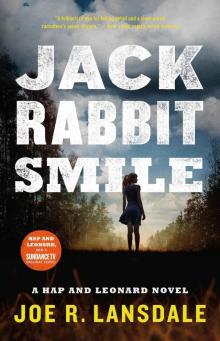 Jackrabbit Smile (Hap and Leonard)
Jackrabbit Smile (Hap and Leonard)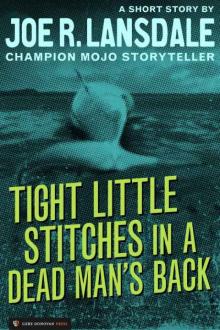 Tight Little Stitches in a Dead Man's Back
Tight Little Stitches in a Dead Man's Back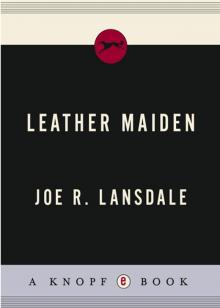 Leather Maiden
Leather Maiden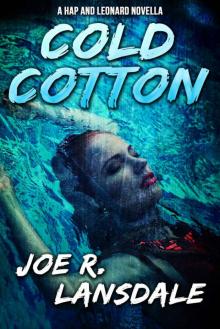 Cold Cotton: A Hap and Leonard Novella (Hap and Leonard Series)
Cold Cotton: A Hap and Leonard Novella (Hap and Leonard Series)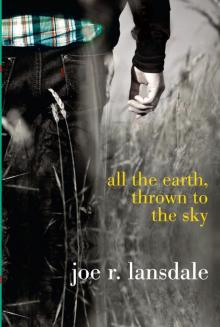 All the Earth, Thrown to the Sky
All the Earth, Thrown to the Sky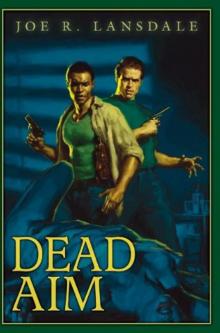 Dead Aim
Dead Aim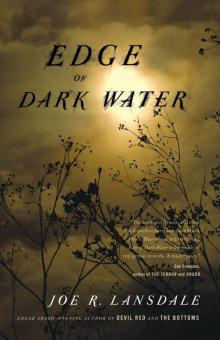 Edge of Dark Water
Edge of Dark Water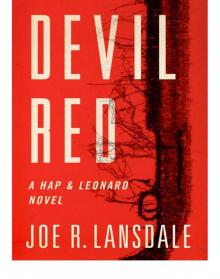 Devil Red
Devil Red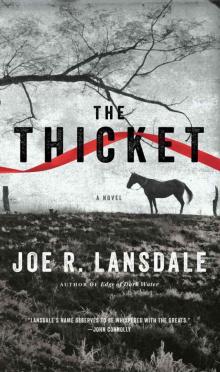 The Thicket
The Thicket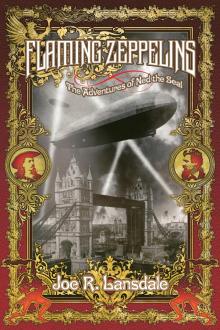 Flaming Zeppelins
Flaming Zeppelins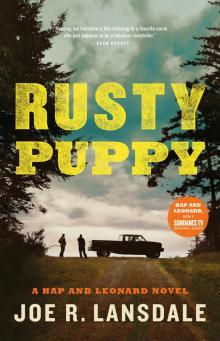 Rusty Puppy
Rusty Puppy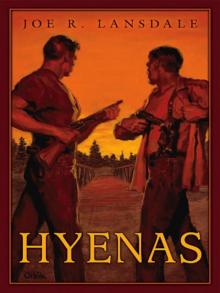 Hyenas
Hyenas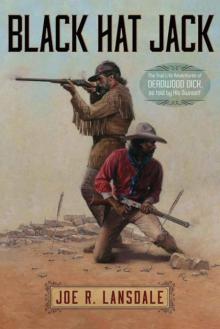 Black Hat Jack
Black Hat Jack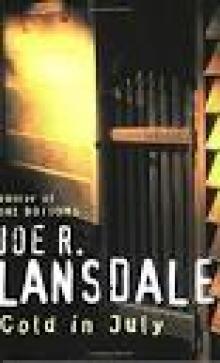 Rare Lansdale
Rare Lansdale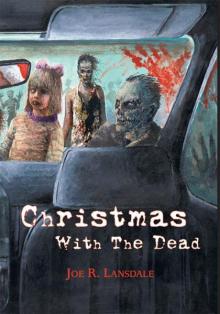 Christmas With the Dead
Christmas With the Dead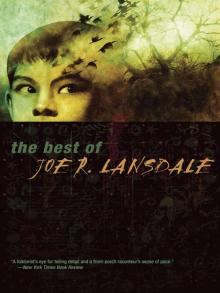 The Best of Joe R. Lansdale
The Best of Joe R. Lansdale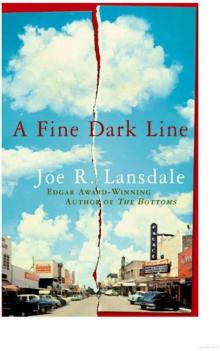 A Fine Dark Line
A Fine Dark Line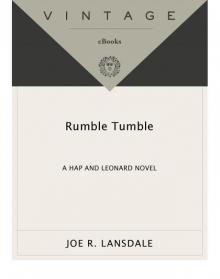 Rumble Tumble
Rumble Tumble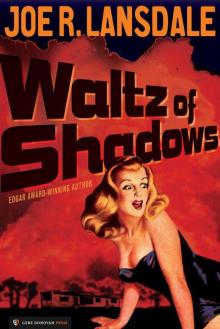 Waltz of Shadows
Waltz of Shadows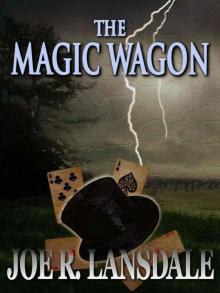 The Magic Wagon
The Magic Wagon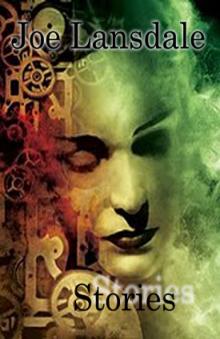 Stories (2011)
Stories (2011)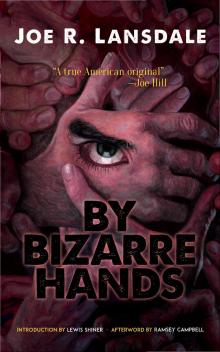 By Bizarre Hands
By Bizarre Hands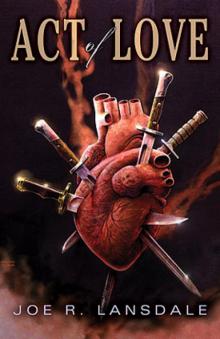 Act of Love (2011)
Act of Love (2011)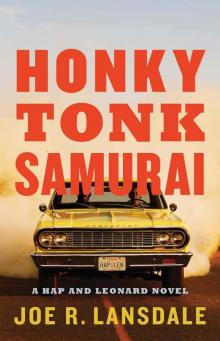 Honky Tonk Samurai (Hap and Leonard)
Honky Tonk Samurai (Hap and Leonard)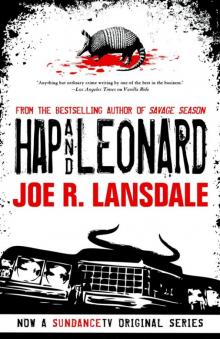 Hap and Leonard
Hap and Leonard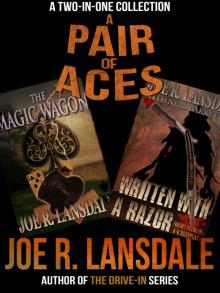 A Pair of Aces
A Pair of Aces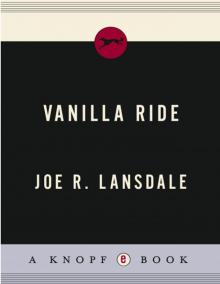 Vanilla Ride
Vanilla Ride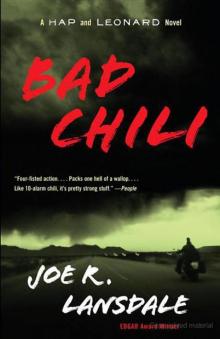 Bad Chili
Bad Chili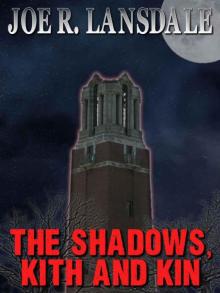 The Killer's Game
The Killer's Game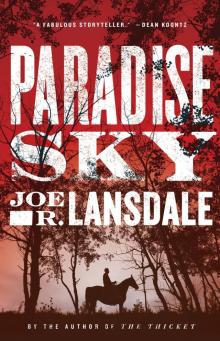 Paradise Sky
Paradise Sky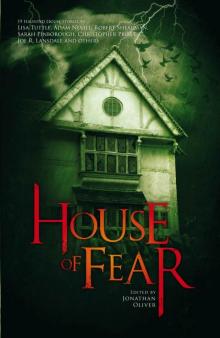 House of Fear
House of Fear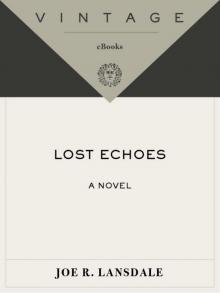 Lost Echoes
Lost Echoes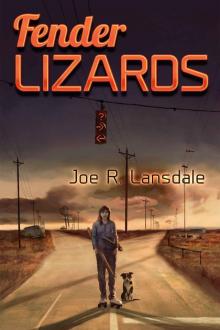 Fender Lizards
Fender Lizards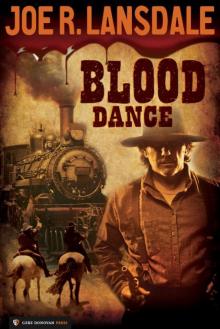 Blood Dance
Blood Dance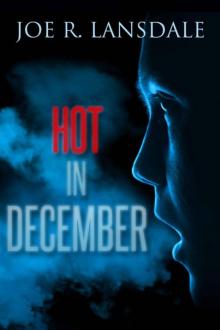 Hot in December
Hot in December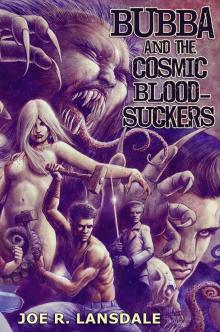 Bubba and the Cosmic Blood-Suckers
Bubba and the Cosmic Blood-Suckers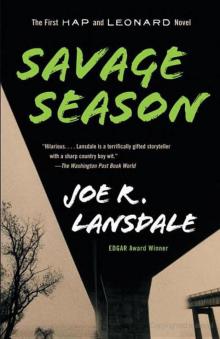 Savage Season
Savage Season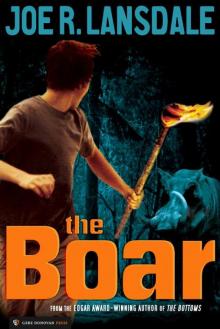 The Boar
The Boar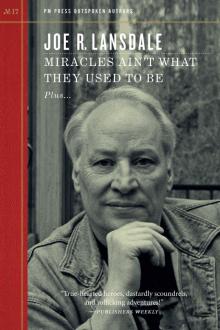 Miracles Ain't What They Used to Be
Miracles Ain't What They Used to Be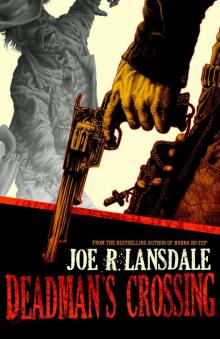 Deadman's Crossing
Deadman's Crossing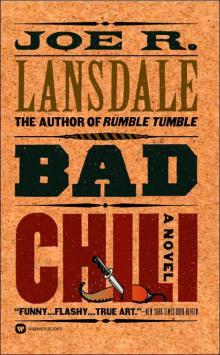 Bad Chili cap-4
Bad Chili cap-4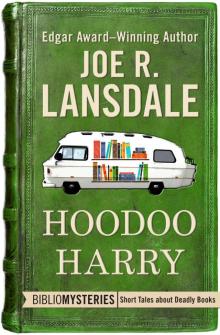 Hoodoo Harry
Hoodoo Harry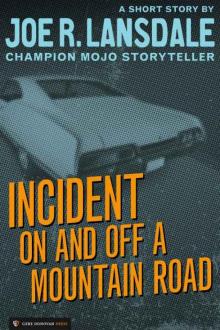 Incident On and Off a Mountain Road
Incident On and Off a Mountain Road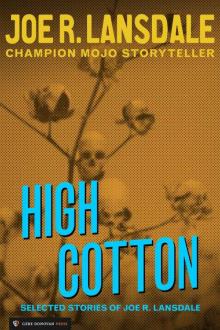 High Cotton: Selected Stories of Joe R. Lansdale
High Cotton: Selected Stories of Joe R. Lansdale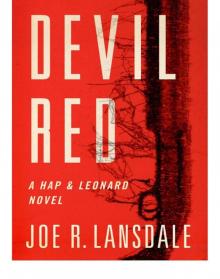 Devil Red cap-8
Devil Red cap-8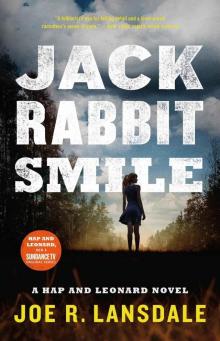 Jackrabbit Smile
Jackrabbit Smile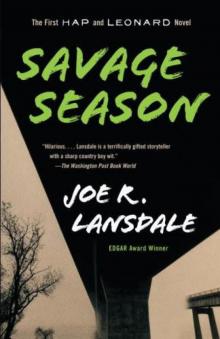 Savage Season cap-1
Savage Season cap-1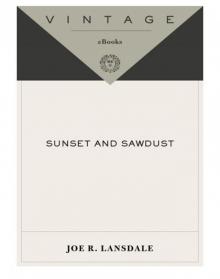 Sunset and Sawdust
Sunset and Sawdust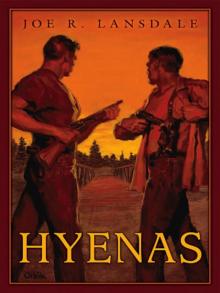 Hyenas cap-10
Hyenas cap-10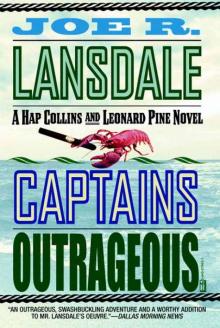 Captains Outrageous cap-6
Captains Outrageous cap-6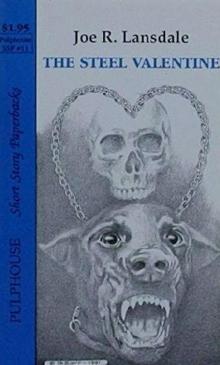 The Steel Valentine
The Steel Valentine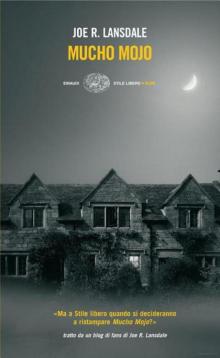 Mucho Mojo
Mucho Mojo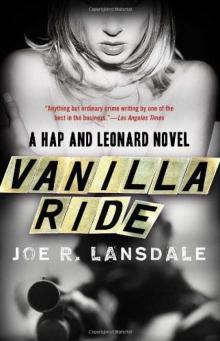 Vanilla Ride cap-7
Vanilla Ride cap-7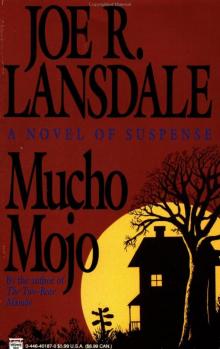 Mucho Mojo cap-2
Mucho Mojo cap-2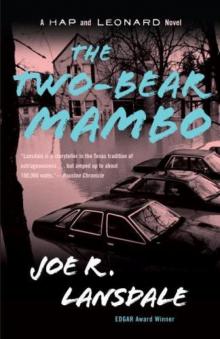 The Two-Bear Mambo cap-3
The Two-Bear Mambo cap-3